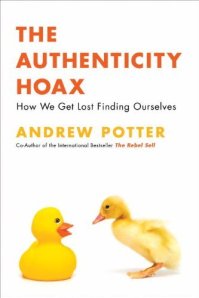 The Authenticity Hoax: How We Get Lost Finding Ourselves (2010)
The Authenticity Hoax: How We Get Lost Finding Ourselves (2010)
by Andrew Potter
296 pages
McClelland & Stewart
=====
It’s probably a bad sign when you’re halfway through reading a book, especially a non-fiction book, and you realize that you don’t have any idea of what the book is really about, in which direction the author is going, or what the body of the text has to do with the subject referred to in the title and opening segment.
Andrew Potter co-authored a book a few years ago called The Rebel Sell, which, for all its drawbacks, made a good point about how the ‘anti-mainstream’ counter-culture, in its veiled and overt demands to buy certain products, appear a certain way, and live a certain lifestyle, was actually the driving force behind consumer culture, and perpetuating many of the things it snobbishly pretended to rebel against.
This particular book is much less clear in its position, and the problem begins with failing to really define what it is about. Though Potter says he’s taking aim at all concepts of authenticity, he quickly glosses over the quest to cure some of the alienation modern people tend to feel with regards to friends and family, their work, or their society. His only comment on these ills consists mainly of ‘they’re paying you, so get over it’.
You’re really not going to stun anybody basing a book on the not-exactly-shocking statements that ‘authentic jeans’ are still designed by someone, that an ‘authentic ethnic restaurant’ might be more marketing than actuality, and that touring the cultural artifacts of a former dictatorship isn’t the same as living under one. But in this book Potter does mostly take aim at what a very small portion of society is looking for in their quest for authenticity – the urban, white, wealthy, over-educated, wasp-y post-moderns with whom the author apparently spends most of his time. If you have any kind of broader experience of what society consists of, you’ll have trouble when he generalizes about what ‘everybody’ is doing these days.
It’s a really scattered, unfocused, poorly argued book, and the fact that the acknowledgments at the end credit several editors for doing a lot of work to make it sound better, and that Potter admits it took far too long to complete, it all just reinforces the impression of undercooked thoughts. Chapters which detail the recent US presidential race, or that consist of highlights of the author’s Eastern European vacation, seem to be just be re-purposed content the author had on hand, rather than tying into the core argument in any strong way.
Put simply, many of the conclusions Potter jumps to are unsupported by the material he presents. Survivalist extremism leads directly into apocalyptic fiction, as if everyone who goes to see an adventure movie wishes for those things to happen to them. Potter tries to make a seldom-heard argument about the suburbs being a triumph of liberal markets instead of a blight, but no statistics are presented about things that might illuminate the discussion, like cost of infrastructure, crime rates, or people’s satisfaction. And I’m pretty sure nobody at the mall is thinking about Jean-Jacques Rousseau, so if you’re going to spend a lot of time on him as central to modern society’s ideas, it’s going to need to be tied in a little better. As an example of the poor reasoning, “In short, the desire for authenticity is the cause of virtually all the major problems with our politics today.” (pg.175) Really? The problem with all of politics? I mean, the more you read and repeat that, the more pulled-out-of-your-ass it sounds.
In the end, Potter’s main viewpoint takes on the incredible hubris and delusion of saying current liberal democracy, with its free-market capitalism, is basically the end of history, and once the rest of the world is absorbed into it, no other political structures will ever threaten it, nor will there be any other kind of life to strive for. He also asserts, without even entertaining any arguments to the contrary, that life is meaningless and nothing can be learned from the world, and someone who thinks differently is a terrorist-in-waiting.
Obviously, I found this a very disappointing read, not only because its conclusions, weak as they are, are completely ludicrous, but because it’s so poorly organized and presented. I still didn’t find any answer to what I think most people are talking about when they look for authenticity. The alienation from family and friends, work, or society at large, has a real human cost, in terms of psychological distress, substance abuse, violence, and decreased productivity and efficiency. It’s simply not true to say “In the end, authenticity is a positional good, which is valuable precisely because not everyone can have it” (pg.267) unless you’re using a definition of authenticity that is far outside what the general use of the word is. A more authentic relationship to oneself, close relations, and the world at large, precludes no one else from the same. Just because there’s no easy answer to questions about authenticity does not mean it doesn’t exist at all. To say that people should continue living in modes in which they are experiencing psychological, spiritual, or even physical distress because there are no perfect solutions and these people have more material comforts than ever, is not only unsupported by this book’s flimsy arguments but borders on the sociopathic.

